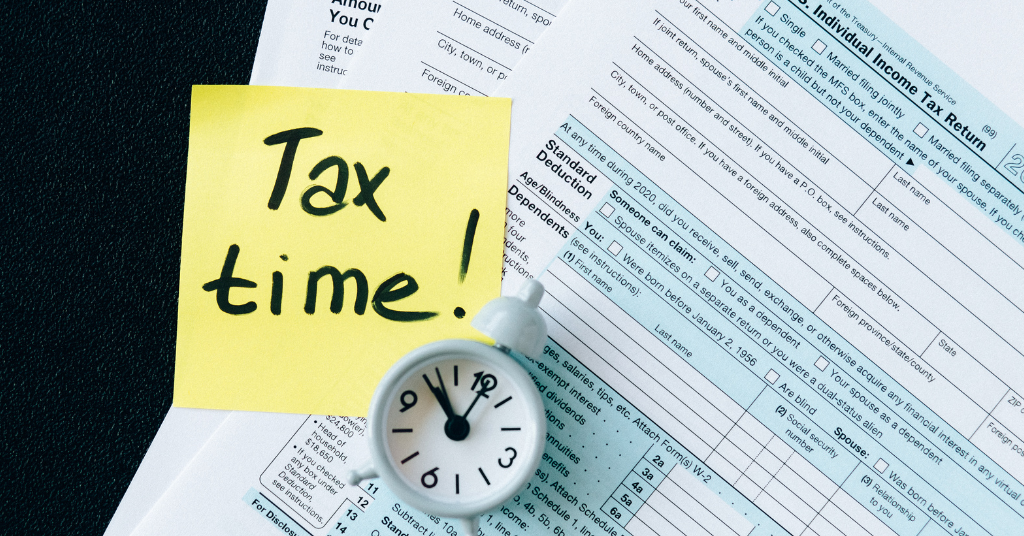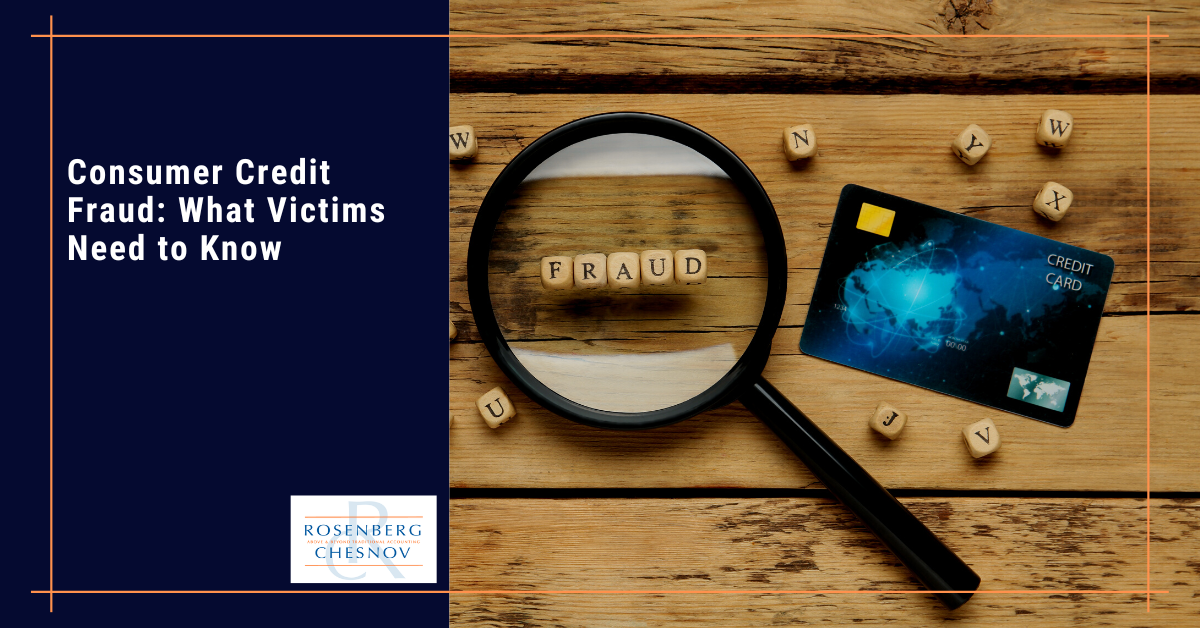

Maximize Your 2024 Refund: Tax Breaks You Might Be Missing
Category: Accounting
$43 billion is the global projection for losses from credit card fraud by 2026.
Fraud attempts are on the rise, with 46% more than last year. The United States accounts for nearly half of all global fraud, and up to 80% of credit cards have been compromised in data breaches (yes, you read that right). Consequently, this is the perfect time for consumers to take credit fraud very seriously.
If those hair-raising statistics aren’t alarming enough, consider the consequences of being the victim of consumer credit fraud, which can include financial losses, damage to credit scores, and the need to resolve fraudulent transactions and disputes with financial institutions.
Fortunately, there are steps you can take to minimize the impact of fraud on your finances and credit history — but it’s crucial that you act fast.
In this post, we’ll explore what consumer credit fraud victims need to know and what steps you can take today to protect yourself against fraudsters.


Consumer credit fraud, also known as credit card fraud or payment card fraud, is a type of financial fraud that involves the unauthorized use of an individual’s credit or debit card information to make fraudulent purchases or transactions.
It is a form of identity theft and can cause financial harm and emotional distress to the victim.
Here are some common forms of consumer credit fraud:
If you are a victim of credit fraud, you must take prompt action to minimize financial losses, protect your credit, and resolve the issue.
If you suspect or know that you have been a victim, take these ten steps immediately:
1. Change Your Passwords and PINs:
2. Contact the Credit Card Issuer or Financial Institution:
3. Freeze or Close Affected Accounts:
4. Review Your Account Statements:
5. File a Fraud Report:
6. Place a Fraud Alert or Credit Freeze on Your Credit Reports:
7. File a Police Report:
8. Monitor Your Credit Reports:
9. Keep Records of All Communications:
10. Be Patient and Persistent:
Here’s the good news: If your card has been used fraudulently, your liability is typically limited.
However, the specific rules and protections vary depending on your location and the type of card used (e.g., credit card or debit card).
In the United States, under the federal law known as the Fair Credit Billing Act (FCBA), your maximum liability for unauthorized credit card charges is limited to $50.
However, many credit card issuers have policies that provide even greater protection. In practice, most credit card companies offer zero-liability policies, meaning you are not responsible for unauthorized charges.
Debit cards may have different liability rules, which is bad news for cardholders.
In the U.S., you are not responsible for any charges if you report a lost or stolen debit card before any unauthorized transactions occur.
However, if you report the loss or theft after unauthorized transactions, your liability can depend on how quickly you report it. If you report it within two business days, your maximum liability is limited to $50. If you wait longer than two business days but less than 60 calendar days, you could be liable for up to $500.
You could be responsible for all the unauthorized charges if you don’t report it within 60 days.
That being said, here’s some more good news: Many financial institutions, both for credit and debit cards, have adopted zero-liability policies, which means you are not held liable for any unauthorized charges as long as you promptly report the loss or theft of your card.
Similarly, your liability is typically limited for unauthorized online or mobile banking transactions if you report the unauthorized activity promptly. Under the Electronic Fund Transfer Act (EFTA) in the U.S., your maximum liability is $50 if you report the loss or theft of your debit card or unauthorized online transactions within two business days. If you wait longer, your liability can increase.
It’s important to review your specific cardholder agreement and check with your card issuer or bank to understand the exact terms and protections associated with your card.
First and foremost, regularly monitor your financial accounts. That means diligently reviewing credit card and bank statements and checking for unauthorized transactions or discrepancies. You can also set up alerts for unusual or large transactions to catch fraud early.
With rates of cybercrime through the roof, securing your online presence with strong, unique passwords for your financial accounts and two-factor authentication (2FA) wherever possible is more important than ever. Password managers can help generate and store complex passwords securely.
To further combat cybercriminals, ensure that you use only secure websites (look for “https://” in the URL) for online transactions and stay vigilant for phishing attempts that impersonate legitimate organizations. You should also install antivirus and anti-malware software on your devices and keep them updated, and be cautious when sharing personal details both online and over the phone, as fraudsters may use this information for social engineering attacks.
Lastly, protect your personal information by safeguarding documents such as credit cards, checks, and statements. Shred sensitive documents before disposal and avoid sharing your Social Security number unnecessarily.
If you have been the victim of consumer credit fraud and would like further guidance (after having taken all of the steps outlined above and followed any instructions from authorities, of course), our team stands ready to assist in any way we can.
If you are a client and would like to book a consultation, call us at +1 (212) 382-3939 or contact us here to set up a time.
If you aren’t a client, why not? We can take care of your accounting, bookkeeping, tax, and CFO needs so that you don’t have to worry about any of them. Interested? Contact us here to set up a no-obligation consultation.
Interested in receiving updates in your mailbox? Check out our newsletter, full of information you can use. It comes out once every two weeks, and you can register for it below.


Category: Accounting


Category: Accounting


Category: Accounting
Send us a message and we will contact you as soon as possible.
Jeff Coyle, CPA, Partner of Rosenberg Chesnov, has been with the firm since 2015. He joined the firm after 20 years of business and accounting experience where he learned the value of accurate reporting, using financial information as a basis for good business decisions and the importance of accounting for management.
He is a diligent financial professional, able to manage the details and turn them into relevant business leading information. He has a strong financial background in construction, technology, consulting services and risk management. He also knows what it takes to create organizations having built teams, grown companies and designed processes for financial analysis and reporting.
His business experience includes:
Creating and preparing financial reporting, budgeting and forecasting.
Planning and preparation of GAAP and other basis financial statements.
Providing insight on financial results and providing advice based on those results.
Jeff also has a long history of helping individuals manage their taxes and plan their finances including:
Income tax planning and strategy.
Filing quarterly and annual taxes.
Audit support.
General financial and planning advice.
Prior to joining the firm in 2015, Jeff was in the private sector where he held senior financial and management positions including Controller and Chief Financial Officer. He has experience across industries, including construction, technology and professional services which gives him a deep understanding of business.
Jeff graduated from Montclair State University, he is a CPA and member of the American Institute of Certified Public Accountants, New York State Society of Certified Public Accountants and New Jersey State Society of Public Accountants.
Jody H. Chesnov, CPA, Managing Partner of Rosenberg Chesnov, has been with the firm since 2004. After a career of public accounting and general management, Jody knows the value of good financials. Clarity, decision making, and strategy all start with the facts – Jody has been revealing the facts and turning them into good business results for more than three decades.
He takes a pragmatic approach to accounting, finance and business. His work has supported many companies on their path to growth, including helping them find investors, manage scaling and overcome hurdles. His experience and passion for business reach beyond accounting and he helps businesses focus on what the numbers mean organizationally, operationally and financially.
He has a particular expertise in early-stage growth companies. His strengths lie in cutting through the noise to come up with useful, out of the box, solutions that support clients in building their businesses and realizing their larger visions.
Prior to joining the firm in 2004, Jody was in the private sector where he held senior financial and management positions including General Manager, Chief Financial Officer and Controller. He has experience across industries, which gives him a deep understanding of business.
Jody graduated with a BBA in Accounting from Baruch College, he is a CPA and member of the American Institute of Certified Public Accountants and New York State Society of Certified Public Accountants.
In addition to delivering above and beyond accounting results, Jody is a member of the NYSCPA’s Emerging Tech Entrepreneurial Committee (ETEC), Private Equity and Venture Capital Committee and Family Office Committee.
He is an angel investor through the Westchester Angels, and has served as an advisor for many startup companies and as a mentor through the Founders Institute.